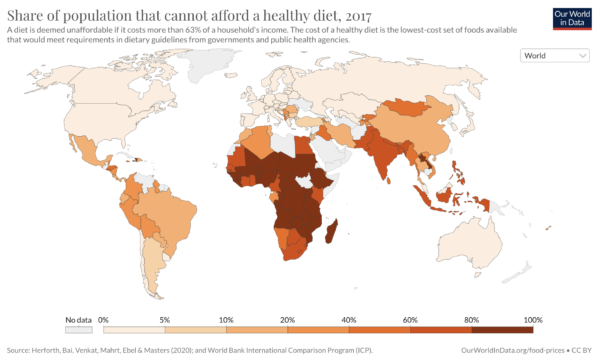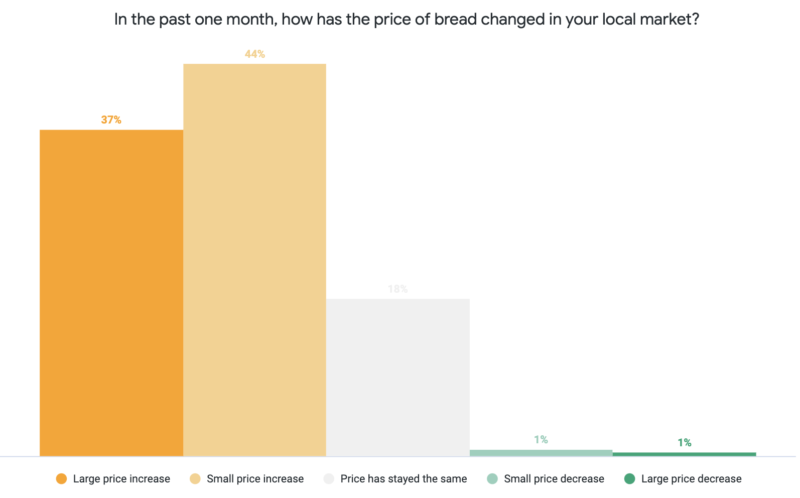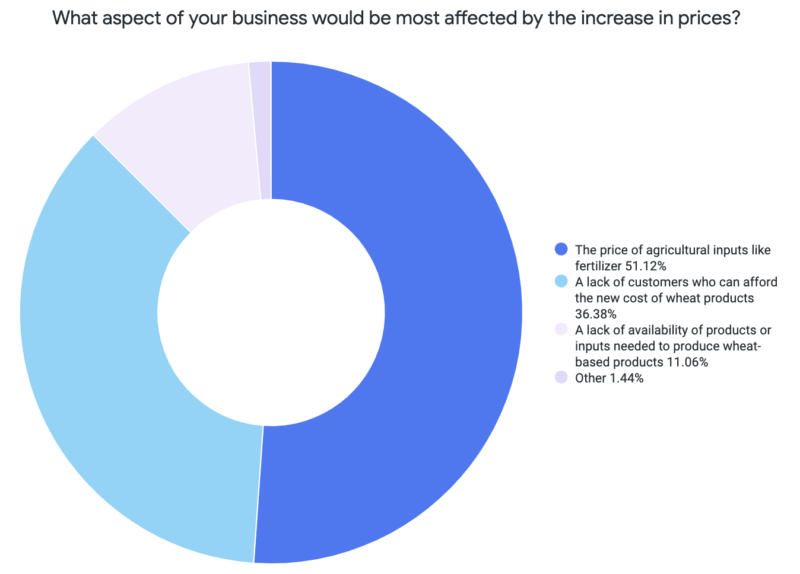In 2020, Russia was the largest exporter of wheat in the world and Ukraine was close behind as the 5th largest exporter of the important global commodity.
Because of this market dominance, when Russia invaded Ukraine in early March 2022, the wheat supply for nearly 30% of the world market was immediately thrown into jeopardy. The war put significant burdens onto growers in both countries – Russia enacted a partial export ban of wheat and other crops, while Ukrainian farmers were sidelined due to intense fighting, plugged supply roads, and continually encroaching militaries.
As the war escalated, so did global wheat prices, jumping from already high levels to prices not seen since the 2008 global food price crisis. Perhaps even more worrying, much of the wheat that is exported from Russia and Ukraine ends up in some of the most food insecure countries in the world.

To better understand how the price increase is affecting populations on the ground and to offer humanitarian organizations a window into the challenges the crisis is causing for everyday people and businesses, Premise released a sentiment survey in 12 of the largest importers of Russian and Ukrainian wheat. The survey gathered 4,200 responses over the course of four days in Azerbaijan, Bangladesh, Egypt, Indonesia, Kenya, Lebanon, Nigeria, Pakistan, Philippines, Tunisia, Turkey, and Yemen.
Despite some misconceptions that wheat is not an important food staple across countries in Africa and Asia, most of the respondents (78%) reported that they purchase wheat-based products on a daily or weekly basis. Contributors also showed an elevated level of concern around how the war in Ukraine could impact prices and supply of wheat and wheat-based products, with 85% of all respondents very or somewhat concerned about a potential shortage or continued price increases. Contributors have noticed a steady increase in prices as well, potentially forcing many of them to alter their consumption patterns.
More than 80% of respondents said that they have seen a small or large increase in the price of bread over the last month. When asked what they would do to counter price changes, more than half said that they would be forced to buy smaller quantities of wheat-based products, while 34% said that they would shift away from wheat-based products entirely.

The change in consumption patterns has also caused concern for business owners in these countries. Nearly all respondents (90%) who identified as business owners that use, grow, or sell wheat or wheat-based products said that their business would be greatly affected by price hikes.
Of these business owners, many were actually worried about the war’s effect on the supply of agricultural inputs – 51% said that they were concerned about the availability of fertilizer. This fear comes amid extreme volatility in the global potash market, a key component of agricultural fertilizer; Russia has enacted some levels of export bans of the ingredient. A further 36% said that they are worried about a lack of customers who can afford wheat-based products at new heightened prices.

In addition to the elements of food security that are a concern with drastic price hikes, the uncertainty can also foster political unrest. Protests around rising prices of many staples have continued in dozens of countries over the last few months, and at least one Iranian citizen was killed in a protest over wheat prices just this month. Given increasing vulnerability and concern, we also asked how the increase in prices made people feel. While 41% said that it made them feel sad, a further 32% said that it made them feel angry.
As organizations continue to track the price increases and their effect on stability, it’s vital that citizen sentiment continues to be gathered to understand the most acute challenges and potential options for aid and relief.
Want to learn more about our international development work? Check out our four-minute tech demo or get in touch with us today.